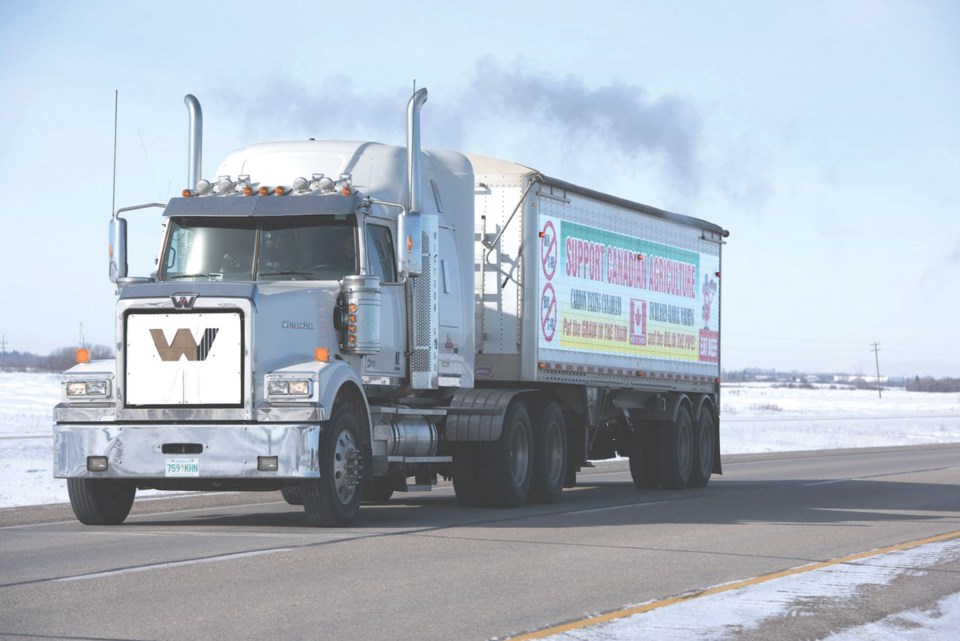While he hasn’t been able to be part of the entire United we Roll Convoy to Ottawa, Jason LeBlanc of LeBlanc Farms is praising the experience and the people who put it together.
The convoy left Red Deer, Alta., in the morning of Feb. 14 and rolled into Saskatchewan later that day. After spending the night in Emerald Park, the convoy resumed, and drove through Manitoba, before finishing the day in Kenora, Ont.
Trucks pulled in to Arnprior, Ont., just outside of Ottawa, on Feb. 18. Rallies were scheduled to happen in Ottawa on Feb. 19 and 20.
Many of the participants from southeast Saskatchewan joined the convoy in Virden, Man., but LeBlanc met them in Regina on Feb. 15, and remained with the convoy until Brandon, Man. He had to come back to the Estevan area due to a prior commitment, but he flew out to Ottawa on Monday so he could meet up with the convoy again.
A hired hand, Jake Fast, has been part of the convoy since Feb. 15. Speaking from Wawa, Ont., on Feb. 17, he was looking forward to reaching the Ottawa area.
He cited several reasons for wanting to be part of the convoy.
“Agriculture is a big deal. We need to get rid of that carbon tax,” said Fast. “And we need to support our country. That’s why I wanted to join these guys.”
Fast said he has received lots of positive reinforcement from people who believe the convoy participants are doing the right thing.
“I have yet to buy a meal,” Fast said during a stop. “They just announced here lots of hamburgers, sandwiches and pizza. They have all that out here again as we’re stopped.”
It’s been a recurring theme throughout the journey.
“I cannot believe the people that even at 10 o’clock at night, the first night we drove, they were waiting out in the middle of nowhere, just waiting for us to come by, and supporting us,” said Fast.
He was looking forward to the rallies in Ottawa, and is excited to get their message across.
LeBlanc echoed Fast’s sentiments about the support from the public. Travelling with the convoy has shown him how big of an issue this really is.
He might go 10-15 kilometres without seeing anything, and then he’ll see someone out holding a sign, encouraging the convoy to stand up for Canada. In one spot, there was a teacher with kids supporting the convoy.
“It makes it all worth the while that we’re going down to try to unite this country, to try to point out some of the obvious things, that we are bountiful with natural resources, and this (Prime Minister Justin) Trudeau does not want it,” said LeBlanc.
He wasn’t disappointed with the number of people on the convoy. While it was billed as having hundreds of semi-trailer units among its core travellers, there were less than 100 who left Virden on Feb. 15.
Some have joined the convoy for part of the trip.
“We had 13 trucks from Swift Current join the convoy, and that was a beautiful sight to see, as that pushed our numbers over the 200-and-something, and then some of them backed off,” said LeBlanc.
He pointed out that there were more than 100 participants outside of Moosomin, and once they reached Ontario, it picked up more momentum.
“Our hope is that we can get up to 150, somewhere in there,” said LeBlanc.
He pointed out it costs $5,000-$6,000 per unit for the round trip to Ottawa, and it’s tough for a lot of people to go.
Even if there’s one person on Parliament Hill because of the convoy, then that one person can deliver the message about the need to fight the carbon tax.
“There’s no excuse for not listening, because those messages do represent the feelings of Western Canada,” LeBlanc said.
While much of the focus of the convoy’s focus has been on the energy sector, there is also a connection to agriculture, because LeBlanc believes the carbon tax will have a crippling effect on farmers.
“If the farmers or the ranchers or the agricultural producers, if we don’t sign the leases to allow the oil industry on our land, they don’t get to drill,” said LeBlanc. “So we have a really nice relationship with many, many oil companies, and they have treated us well over the years, and we have to keep that connection going.”
Once oil is drilled on a farmer’s land, it’s refined into fuel, which farmers use on their equipment.
“It goes hand in hand,” said LeBlanc. “Without those two, we can’t produce food. We need those two to go hand in hand, and that’s the nice part about Canada. We have it all.”
The interactions on the convoy have been very good. LeBlanc said he has newfound respect for the Yellow Vest Movement, who he believes get tainted because of a few bad apples.
“These people who are on this convoy, some of them have not had a paycheque for two years. It’s desperation. Their frustration levels are at boiling points. We’ve managed to get the story out on what’s going on.”
LeBlanc stressed he was a participant and not an organizer for the convoy. He was only going to participate if the convoy carried a message of national pride and unity.
“I got involved because it was going to be a peaceful protest and a peaceful rally, and that’s what we’re trying to do is unite Canada to show them that we have the oil sector, we have energy, we have food, we have cheap food policy, we have everything in place that you could possibly want in a country, and one man’s global agenda is to ruin it, and to do urbanization of rural people.”
He was very appreciative to be asked to be part of the group, and he’s pleased to see other farmers on the convoy.



